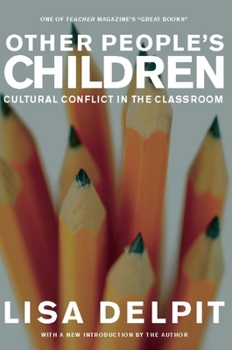Other People's Children: Cultural Conflict in the Classroom
Select Format
Select Condition 
Book Overview
The classic, groundbreaking analysis of the role of race in the classroom and a guide for teaching across difference, from the MacArthur award-winning educator "Phenomenal. . . . This book] overcomes fear and speaks of truths, truths that otherwise have no voice." --San Francisco Review of Books
In this groundbreaking, radical analysis of contemporary classrooms, MacArthur award-winning author Lisa Delpit develops the theory that teachers must be effective "cultural transmitters" in the classroom, where prejudice, stereotypes, and assumptions often breed ineffective education. Delpit suggests that many academic problems attributed to children of color are actually the result of miscommunication, as primarily white teachers educate "other people's children" and perpetuate the imbalanced power dynamics that plague our system.
Now a classic of educational thought and a must-read for teachers, administrators, and parents striving to improve the quality of America's education system, Other People's Children has sold over 250,000 copies since its original publication. Winner of an American Educational Studies Association Critics' Choice Award and Choice magazine's Outstanding Academic Book Award, this anniversary edition features a new introduction by Delpit as well as important framing essays by Herbert Kohl and Charles Payne.






